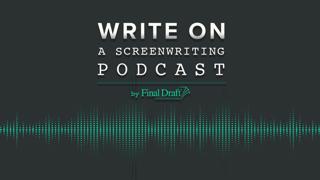
Write On: 'Lawmen: Bass Reeves' Showrunner Chad Feehan
"I grew up as a huge fan of Westerns but the reality of the landscape at the time was that it was incredibly diverse. And we've rarely seen that diversity on screen. I feel incredibly fortunate and humbled by the opportunity to show what life was really like in Indian territory in 1875. That it was a melting pot of cultures and races. It speaks to the beauty of Reconstruction," says Chad Feehan, showrunner for Lawmen: Bass Reeves on Paramount+. The show is part of the highly successful Taylor Sheridan television landscape, that includes shows like Yellowstone and 1883. On today's episode, I speak to Chad about taking on the historical figure of Bass Reeves (played by David Oyelowo), who lived during America's Reconstruction period that is rarely depicted in film or TV. Though Chad and Bass come from very different backgrounds, Chad says he was able to write the character of Bass by focusing on the big emotions the two men shared. He gives this advice about writing people different than yourself: "Tap into your deepest emotions and find a way to relate them to what the character is going through. I think a lot of times when, you start writing, you try to imagine emotions, right? But the range of emotions that we all feel is relatively universal. They just take different shapes and sizes, right? We all know what heartbreak is, we all know what joy is. Tap into that and then transpose it into a situation that the character is also experiencing, if that makes sense. I learned about sudden loss with my mom. I've learned about deep-seated overwhelming love through my children and that emotion is universal," he says. To hear more about Chad Feehan's background, working on the FX show, Ray Donovan, and his overall writing process, listen to the podcast.
5 Feb 202426min

Write On: 'Miller's Girl' Writer/director Jade Halley Bartlett
"Personally, I think writing is bleeding. It's blood magic. It's very hard to do," says writer/director Jade Halley Bartlett of the new Southern gothic romance, Miller's Girl. Bartlett started her career as an actress, but it was an unexpected journey that led her to Los Angeles and magically landed her in the world of studio screenwriting. After spending a year at Marvel Studios, writing a draft of Dr. Strange in the Multiverse of Madness – only to be replaced on the job – Jade's first feature film is now in theaters. In the podcast, Bartlett talks about dealing with rejection, getting hired to rewrite scripts and making the shift to directing. But at the end of the day, she says writing is really about overcoming your fear to get your big ideas onto the page – even if the first draft sucks. "You've got to give up the perfectionism. It is not going to come out perfect. I think a lot of writers are editing in our head while we're doing it as opposed to just like letting it flow out. I would say let yourself write the 170-page draft. There's going be so much magic that will come from it," says Jade. To hear more, listen to the podcast.
30 Jan 202441min

Write On: 'American Fiction' Writer/Director Cord Jefferson
"I think that approaching the grand things through the smallest entryways possible is the best way to go about taking on these massive issues… So yes, this movie is about race and racism and art and who's allowed to make certain kinds of art - these are really big, unwieldy issues. But the reason that I think people can relate to them –and it doesn't feel so top heavy or clumsy – is because you see it through a character that was deeply personal to me," says Cord Jefferson, writer/director of American Fiction. Based on the book Erasure by Percival Everett, American Fiction is a powerful and often poignantly funny exploration of race in literature, film, family and the marketplace. It toes the line between being relatable and absurd. "I wanted to make a movie that felt satirical but never farcical. I wanted the movie to feel like life and life is neither one thing or another, it's neither comedy nor tragedy," says Jefferson who made the decision to use humor in the film but he never let the comedy get too broad. Jefferson also talks about his journey from journalist – an editor at Gawker – to writing for TV shows like The Watchmenand Succession. "If you can write an interesting article, you can probably write a novel. If you can write a novel, you can write a screenplay. I think that it's the same basic idea, which is you need to keep somebody interested in what you're saying from the beginning to the end and what is the best way to keep somebody interested in what you're saying for this long?" says Jefferson. Take a listen to the podcast for a deep dive into the screenplay for American Fiction.
18 Jan 202429min

Write On: 'Spider-Man: Across the Spider-Verse' Writers Chris Miller, Phil Lord and Dave Callaham
"The lesson we keep learning is that the thing that breaks you [into Hollywood] is your weirdest idea. The thing that only you can write… All of our friends who have done that – it's been a fulcrum in their career," says Phil Lord, co-writer of Spider-Man: Across the Spiderverse. On today's episode, I chat with Phil Lord, Christopher Miller and Dave Callaham about taking the Spider-Man franchise into the modern era, making it fresh, heartfelt and multicultural. While Lord and Miller both won Oscars for 2018's Spider-Man: Into the Spiderverse, they brought Callaham on board to help finish the sequel and collaborate on the third installment, Beyond the Spiderverse. What surprised me most about my Zoom chat with the trio was how down to earth they seemed, how open and honest they were about struggling to make Across the Spiderverse work for everyone, including their discerning animators in India. Lord, Miller and Callaham also talk about taking a risk with the first act of Across the Spiderverse, turning their villain Spot into a multidimensional character and why creating a "multiverse" of Spider People was important to them. Callaham also shared this turning point in his career: "I had not gone to film school so everything I learned about screenwriting was from Syd Field and from coffee table books and there were all these rules about how you have to write and how a structure has to be. And how you have to handle things on the page. Ten years in, I got really bored. I felt like I wasn't being honest about the way I was writing material… So I wrote this fairly idiotic, ridiculous script but I wrote it in a style that sounded like the way that I talk, it was conversational and it was fun. I had little of asides to the reader which I know sounds really awful, but it seemed to work at the time and that opened my career up pretty substantially… That happened because I was being more honest with myself as a writer and I was not trying to write like other people anymore. It worked and I never looked back," he says. Listen to hear more about the writing process for Spider-Man: Across the Spiderverse.
11 Jan 202440min

Write On: 'Dumb Money' Writers Lauren Schuker Blum & Rebecca Angelo
"When we were starting [to write screenplays], we were told, 'Write your story, write your story, write your story.' But our story is not that interesting. So, I would say, don't write your story necessarily, write the story that you fall in love with and find the human connection between you and the characters that you are depicting," says Dumb Money co-writer Rebecca Angelo. On today's episode, I talk with writing partners Lauren Schuker Blum and Rebecca Angelo about their recent film Dumb Money, that tells the true story of the Game Stop stock roller coaster ride led by real-life populist hero, Keith Gill, aka Roaring Kitty, played by Paul Dano. Lauren and Rebecca talk about writing the screenplay super quickly because there were at least nine other competing projects in development at the time. It seems everyone in Hollywood wanted to tell this feel-good story that has a happy ending for the common man. They also tell me about using the structure from sports movies to craft the screenplay, how they employ "radical empathy" will their characters and the importance of adding comedic elements when telling complicated stories. "You know, we could have made a choice to have this movie be a heavy drama. But it felt like we were able to land some bigger ideas when people are laughing before or after even during those moments," says Lauren Schuker Blum. For a deeper dive into their writing process, take a listen to the podcast.
6 Jan 202437min

Write On: 'Blackberry' Writers Matt Johnson and Matthew Miller
Final Draft's Write On Podcast sits down with Blackberry writers Matt Johnson and Matthew Miller to talk about how they wrote this epic story of the rise and fall of the world's first portable email machine. Johnson and Miller loosely adapted the script from Jacquie McNish and Sean Silcoff's book Losing the Signal: The Untold Story Behind the Extraordinary Rise and Spectacular Fall of BlackBerry. The film Blackberry is a bio-pic dramedy that follows the fictional story of the Blackberry creator Mike Lazaridis, played by Jay Baruchel and his main investor played by Glenn Howerton. "Because we had the book, it was the blueprint for the movie. It has so many of the facts and details that we extrapolated and then sort of placed in the script," says Miller. The production of the movie was a bit like the push to get Blackberry into the marketplace - there was a lot of hustle. "The structure of the movie as it stands came from needing to reuse the same locations over, and over again," says Johnson. We sat down to hear about this wild ride from true story to script to budgetary concerns and on-screen production. Click to hear more and listen to the podcast.
22 Dec 202327min

Write On: 'The Iron Claw' Writer/Director Sean Durkin
"I just really encourage people to truly go to those darker places because the way forward in dealing with dark material is not to do some partial version of it. Go there so that it sparks a truth to people watching it because people want to be moved. People want to see their experiences reflected in a new way back at them. If you're drawn to it and it's meaningful to you, chances are it's going to be meaningful to others. Stick with it and be brave," says writer/director Sean Durkin about exploring the darker side of human nature on film. Durkin's new film is The Iron Claw, starring Zac Efron and Jeremy Allen White as brothers from the real-life wrestling family, the Von Erich Brothers, who are said to be cursed. Durkin talks about his childhood obsession with wrestling, using the structure of a Greek Tragedy to craft the screenplay and investigating American masculinity through the lens of this one Texas family. Just a warning: This podcast discusses suicide as it relates to the characters in the film. If you or anyone you know is struggling with suicidal thoughts or is in crisis, please call or text 988 to reach the Suicide and Crises Lifeline. To hear more about Durkin's journey of writing and directing The Iron Claw, click to listen to the podcast.
21 Dec 202334min

Write On: 'Air' Screenwriter Alex Convey
The film Air was released in theaters back in April – right before the WGA Writer's Strike. It tells the story of how the iconic partnership between Nike shoes and basketball player Michael Jordan came to be way back in 1984. It's one of those partnerships that really wasn't supposed to happen, but when it did, it changed the world of sports marketing forever. Directed by Ben Affleck, the script is written by Alex Convery and made the Blacklist in 2021. But just like the partnership between Nike and Michael Jordan, there are a million reasons why this film shouldn't have happened but luckily, it did! "If you are really passionate about an idea and believe in it, you should write it. Whether it seems practical or not because that's typically going to produce your best work. And producing your best work is ultimately the goal, right?" says Convery. Convery also says it's important to be patient and persevere. "I came out from Chicago in 2010 and it took until 2023 to get a movie released. It can take a long, long, long time and that's okay…there's no finish lines. Just invest in the work itself. Surprise yourself on the page, have fun and make yourself laugh!" For a deeper dive into Convery's screenplay, listen to the podcast.
20 Dec 202339min





















